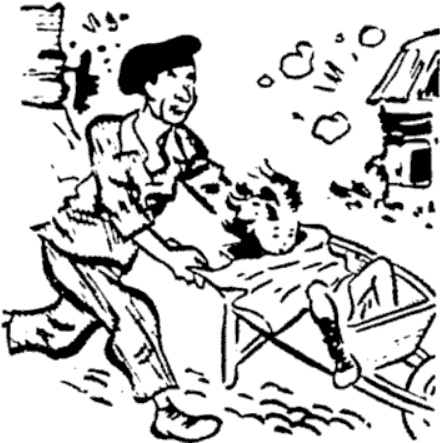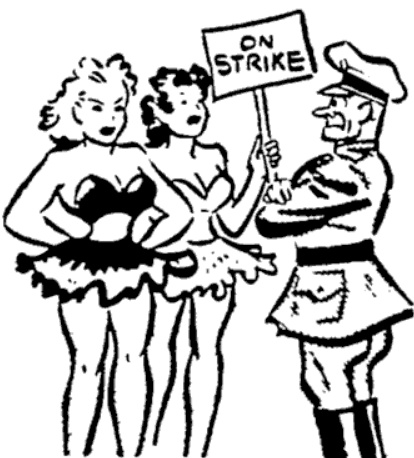U.S. tanks drive two miles in Italy
Stalemate broken below Livorno
By Reynolds Packard, United Press staff writer
…
Stalemate broken below Livorno
By Reynolds Packard, United Press staff writer
…
1,200 bombers strike; South France also hit
By Walter Cronkite, United Press staff writer
London, England –
More than 1,200 heavy bombers, in the war’s greatest U.S. raid on a single target, bombed the Munich area for the second time in 24 hours today, while 250-500 Liberators based in the Mediterranean area attacked railway yards in Nîmes and Miramas in southern France.
The fleet from the Mediterranean encountered few enemy fighters in its attack on the railyards at Nîmes, 35 miles southwest of Avignon, and at Miramas, 35 miles south of Avignon. It also attacked two rail bridges, one on the Riviera line over the Var River, the other on the same line at Théoule-sur-Mer, near Cannes.
Luftwaffe belittled
The two-way attack was carried out with such little fighter opposition that a high officer of the U.S. Strategic Air Forces in Europe, observing that German air losses have exceeded production since January, said the Luftwaffe was no longer a major factor on any front.
It came, too, as SHAEF announced that Allied Air Forces during June had dropped 27,000 tons of bombs on Germany and German-occupied territories.
In support of British troops on the Normandy Peninsula, meanwhile, U.S. twin-engined bombers struck at supply depots of German mechanized forces backed up on the Orne River line south of Caen.
Attack fuel dump
Two forces of 9th Air Force Marauders, operating a quarter of an hour apart, attacked a big fuel dump in the forest of Cinglais, 10 miles south of Caen – and incidentally punished concentrations of troops in the area.
Other Marauders went after other fuel dumps along a secondary supply line farther behind the front, striking one in Forêt d’Écouves, 30 miles east of the front, and another at Forêt d’Andaine, eight miles east.
Due to continued adverse weather, the Munich raiders again were forced to drop their bombs through clouds by means of instruments and were unable to observe the results.
Opposed by flak
The fact that the Americans attacked again over a cloud floor and the German radio failed to mention heavy air battles indicated the Fortresses and Liberators probably made the 1,000-mile roundtrip to Munich opposed only by flak.
Munich’s last 24 hours have been one of the worst any city has experienced during the war. The total time of the great bomber formations spent over the city in the two raids was scarcely more than one hour, but in those 60 minutes, it was estimated they unload 6,300 tons down on the city of 680,000 persons – the fourth largest city in Germany.
A dispatch from Zürich, meanwhile, reported that three U.S. bombers had landed in Switzerland.
Take half hour to pass
Early indications were that the raid was one of the largest Allied aerial offensives in several days.
One formation along required a half hour to pass over the southeast coast of England and when it returned several hours later passed another large force heading toward Calais.
During the night, RAF Mosquito bombers again struck into Germany, attacking industrial objectives in the Ruhr, while other British bombers, escorted by Spitfires, raided the German flying bomb installations in northern France. Both operations were carried out without loss.
By Henry Gorrell, United Press staff writer
CARENTAN: My jeep rolled past a field of wooden crosses, the civilian dead of Carentan.

The Germans plug shells into Carentan regularly. The story from Berlin probably would be that they were after the bridges across the Douve. But the shells I saw fall today exploded nowhere near the bridges. They blasted a bakery shop and killed or severely wounded more than 20 women and children.
I swerved and heard the boom of the German guns. Then the shells exploded in nearby houses and shops. A medical officer borrowed my jeep to round up U.S. Army ambulances to care for the wounded.
I tried to help by getting civilians off the street. I saw a Frenchman dash up with a wheelbarrow, gather up a child who lay with her head half torn off and run for the first-aid post.
Nuns, oblivious of the shelling, led small children to cover. Two little girls, covered with blood, walked hand in hand toward the aid post. One had a fragment in her hip and walked with a limp. The other’s head bled. Their faces were pale, but they did not cry.
The shelling ended abruptly as fighter-bombers roared over to paste the German artillery. Shopkeepers began to clean up the wreckage so they could resume business.
There will be more crosses in the field outside of Carentan in the morning.
CARTERET: The 23 dancing girls of “La Revue de Paris” went on strike against the U.S. Army today. They were black and blue from riding trucks without cushions – and the Germans had paid more to see their show.

There were no bombs falling on Carteret.
“We cannot live on the dollar a day the Americans allowed us,” Jinnette Rolland, fiery star of the show, shouted, gesturing toward the shack where the dancing girls have been forced to live since the German soldiers moved out of the town’s hotel.
“Beezness is bad – the Germans paid 30 francs to see the show,” Jean Bellanger, manager of the troupe, said.
The dancing girls did not think they should be forced to eat the C and K rations allotted them by U.S. troops, and they resented the fact that they were forced to use Army trucks as transportation.
Jinnette complained:
We are all black and blue here [she showed where] because the trucks have not the cushions.
They have refused to give any performances for the troops unless their salaries are increased another dollar a show. Their show was broken up on D-Day, the girls shrieked, “The Germans left then.”
Two cities in a day’s work.
Endorsement expected within 48 hours
By Daniel M. Kidney, Scripps-Howard staff writer
…
Union claims ruling ‘sets up an artificial conflict between veteran and worker’
By Fred W. Perkins, Pittsburgh Press staff writer
…
Brownell says President is using vital as Commander-in-Chief to retain office
…
Senator Tobey leads in New Hampshire race; Thomas unopposed in Utah election
By the United Press
…
Senator noncommittal on Vice Presidency
By Robert Taylor, Press Washington correspondent
…
Allies face problem of what to do with partisans when Nazis have been repelled
By Edward P. Morgan
…
Foe will be stronger and better equipped
By Ralph Teatsorth, United Press staff writer
…
Warships again shell base south of Saipan
By William F. Tyree, United Press staff writer
…
The invasion of France brings to a climax the long, dangerous years of effort by members of the French underground. The day for which they had been toiling and waiting dawned when Allied troops went ashore in Normandy – although the struggle they face will still be long and costly. Arms and ammunition for 75,000 French patriots have been distributed by Allied forces.
The underground, coming into the open almost immediately after the Normandy landings, has already tied up large German forces in southern and southeastern France. We shall hear more from it, but it has already done more than many Americans realize.
We read that 40 percent of German shells are duds, that there is a bottleneck in German plane replacement parts, that German troops and supplies are delayed by transportation tie-ups. And for this we can thank the underground as well as our Allied fliers.
The underground began in the shattered wreckage of a defeated France. Its organizers trained men and women for sabotage. The underground counteracted German lies, converted wavering patriots, published newspapers, wrecked enemy transportation and communication, and poisoned food going to Germany.
The members met in Paris subways and bombed-out houses. They stole arms, and transported them under Germans’ noses. They were cold and hungry and sick, but they kept the spirit of free France alive, and kept the Allies informed of important German military developments by secret radio. Now, though still insufficiently armed, they create valuable diversionary assistance to the advancing armies of liberation.
These patriots will eventually play an important part in the liberation of their homeland. The disorganized French Army was crushed hopelessly four years ago, but that blow and the hard years since have failed to kill France’s devotion to liberty. It will live again.